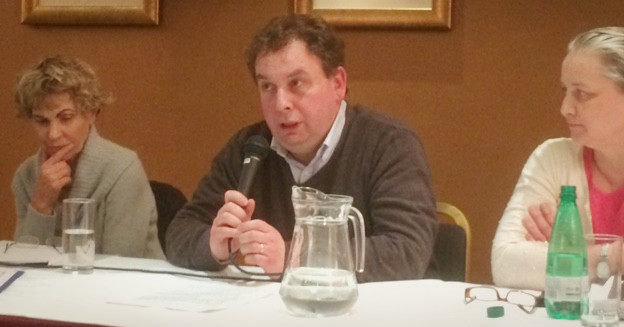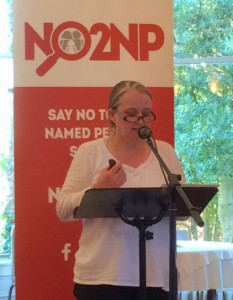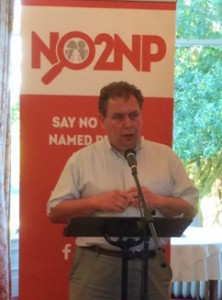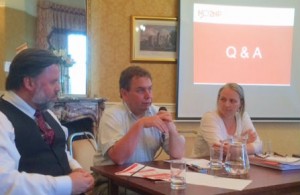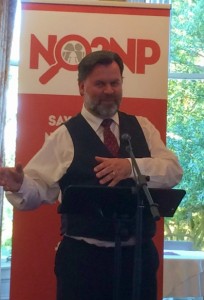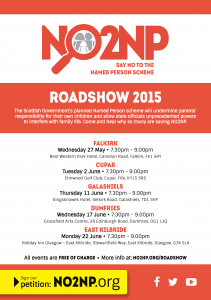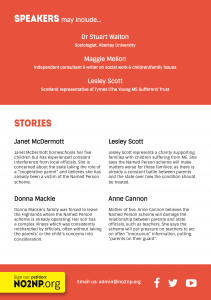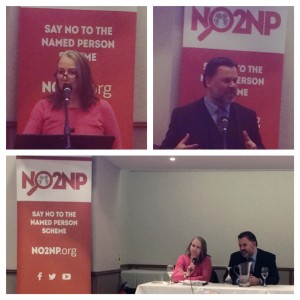Blog
Keeping you up to date on the progress of the Named Person scheme and the NO2NP campaign.
NO2NP ROADSHOW: KILMARNOCK
Posted 9 years agoThe Dean Suite of Kilmarnock’s Park Hotel was full on Wednesday night for the latest stop for the NO2NP Roadshow. We even had a journalist and photographer from a national newspaper turn up! Word about our roadshow events is certainly getting around.
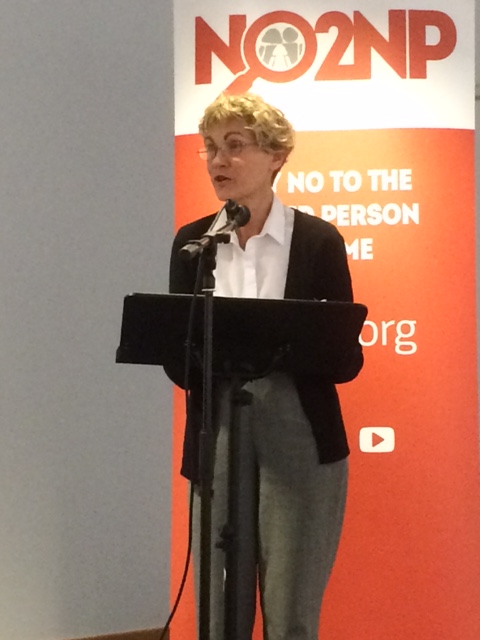
After a video was shown from last week’s Question Time in Aberdeen (where the Named Person was discussed), community paediatrician Dr Jenny Cunningham gave the first talk. She said that a child’s wellbeing (something nowhere defined in the legislation) is going to be assessed and judged, not by parents, but by health visitors, teachers and social workers.
Jenny continued: “The assumption is that parents are incapable of ensuring their children are safe and healthy and happy – and incapable of accessing the various services without the assistance of a third party.” She also expressed her concern about information sharing with various agencies and third parties and the creation of a central database: “Who controls it? Who can access it? What will happen to all the information on it?”
She finished by saying that the Named Person scheme “undermines, not supports, parental authority. Parenting is not some formulaic prescription of right and wrong practices: it’s all about parents’ relationship with their children”.
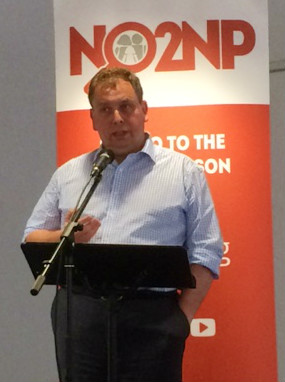
Next up was Dr Gordon Macdonald, CARE for Scotland’s Parliamentary Officer. He explained the reasons behind NO2NP’s opposition to the Named Person scheme, which are really threefold. First, it’s universal in its nature – it’s not just for a few vulnerable children and there is no opt-out – and no opt-in either. Secondly, it’s about the nebulous concept of wellbeing, not welfare (which is defined in law as significant risk of harm or neglect). Wellbeing is much harder to define, indeed there is no definition of it in the Act. And the third reason is the widespread data sharing that will take place, for which there is no opt-out. Despite Nicola Sturgeon’s assurances that the scheme is not mandatory, the data sharing aspect will be universal and compulsory, with no consent required for the sharing of personal and sensitive information.
Gordon’s children’s school recently sent him a letter which said: “It is our practice to share information”, which is far removed from the legal requirement of “strict necessity” for such information sharing. If parents refuse to cooperate, then that itself becomes problematic. Gordon went on to say that the ideology behind the scheme is that children’s groups see children as being fully autonomous, when in fact they are not.
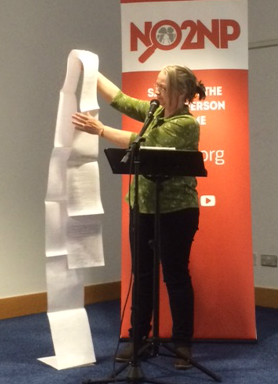
Lesley Scott from TYMES Trust then spoke about the fact that children and young people must show progress in the eight areas of wellbeing (SHANARRI) in order to be assessed as doing well now and in the future. But even supporters of this scheme cannot find the words to explain the concept at the heart of the Named Person. Lesley went on to say that “in East Ayrshire you are part of the AYRshare model for health and social care collaboration.
NHS Ayrshire and Arran along with North, East and South Ayrshire Councils have access to shared files which are created by practitioners based on a child’s NHS number. ‘At the push of a button’ practitioners can ‘push’ information on to AYRshare. Police are also on AYRshare and there has apparently been a successful test in Dalmellington involving GPs, pharmacy, health visitors and education – this trial is being extended to Loudon.”
Lesley had referred to a chronology of a child’s life that health visitors will use and this timeline of ‘significant events’ is one of the documents that will be shared through systems like AYRshare. “But what is a ‘significant event’?”, Lesley asked. She then produced another ‘non-exhaustive’ guide from the Government, which includes:
• Positive or negative changes in family circumstances, e.g. housing, birth of a sibling, emotional wellbeing
• Childhood illnesses
• Dates of immunisations and screenings
• Physical and mental health and wellbeing of child, parents/carers
• In Perth and Kinross, parental non-engagement is also classed as a significant event
In other words, she concluded, anything and everything will be logged – and shared.
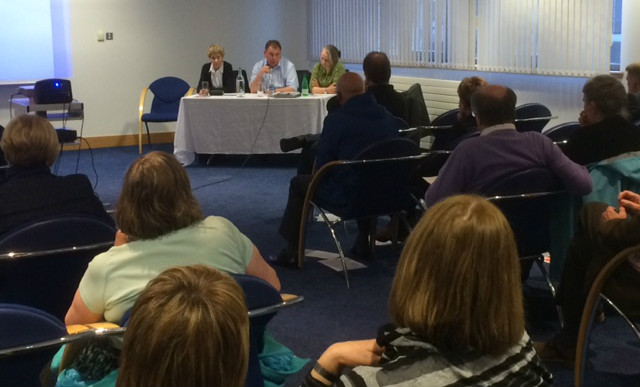
After showing a video about the history of the NO2NP campaign, Nigel Kenny suggested some ways in which people could be involved, before Dr Stuart Waiton from Abertay University hosted an extended Q&A.
Several people signed up as volunteers and a local team will be in Kilmarnock’s town centre this Saturday for our latest Action Day. If you live in the area, please come and say hello to them!
The Curious Case of the ‘Named Midwife’
Posted 9 years ago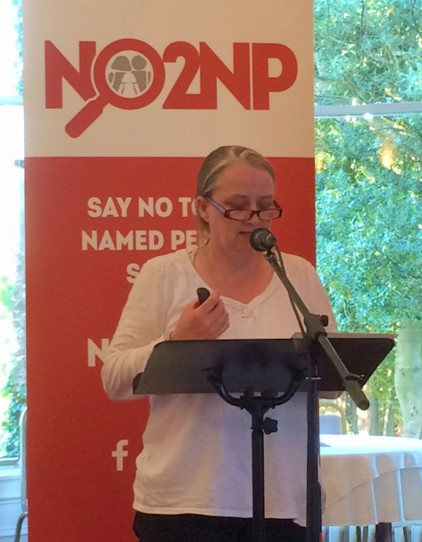
Lesley Scott, Scottish Officer for Tymes Trust and a regular NO2NP Roadshow speaker, spends a lot of her time delving deep into the chaotic detail of Government documents. She shares some of her latest findings involving a curious change to the implementation of Named Persons and some guidance suggesting a compulsory plan for every child – not just parents who ask for it or children who are identified as vulnerable.
Back in December 2010 the Scottish Government produced ‘Practice Briefing 1: The role of the Named Person’. This was the first of eight Practice Briefings that were written “to help practitioners and managers put Getting it right for every child into practice in their agencies”.
This document states that “During pregnancy and the early period following birth, the child’s Named Person will be the midwife assigned to the family.”
This mirrors the established practice model in the GIRFEC Pathfinder trialled in Highland which has the midwife as the Named Person until the baby is ten days old. This ‘Highland Practice Model’ has formed the basis of the success claimed around the GIRFEC approach – claims which have been used to push forward this legislation.
But a document called “RCN briefing and survey: Scottish Government consultation on implementing the Named Person” from March 2015 has an interesting adjustment noted on page 5. It declares that the “The Health Board should identify the prospective Named Person for the baby, as soon as reasonably practical and not later than 28 weeks gestation. In the vast majority of cases, this should be the health visitor. This proposal has changed from the Scottish Government’s original intention that the Named Person should be the midwife…” [bold added]
The Highland Council and NHS Highland also brought out a document in March 2015 called “Guidelines for Maternity Services Getting it Right for Every Mother and Child” that reflected this change. The document states: “The premise of GIRFEC is focused on the needs of a child”. It expands that, however, “within a maternity context the approach can be used as a model which provides the same principles and tools that can reflect the needs and risks to a woman and her baby.” ‘Baby’ the document clarifies, “includes an unborn baby during the antenatal and intranatal periods”.
The document notes that the Highland Practice Model “requires that each child should have a plan which considers their health and wellbeing” [bold added] and that this ‘plan’ is “developed by the named person…” This would seem to contradict claims that the Named Person will only advise and support those parents/children who ask for it – rather there is a requirement for each child to have a child’s plan which means state intervention to some degree. Further to that, the document then says that the “aim in Scotland … is for each pregnant woman to have a named midwife…” It then states that “the named midwife in Highland is able to undertake a named person role if required during pregnancy…” thereby seeking to draw a distinction between the ‘named midwife’ role and that of a ‘Named Person.’ Except – the document then goes into the detail of the duties of the ‘named midwife’, which look to be identical to those of a Named Person.
A ‘named midwife’, the document explains, is “responsible for undertaking risk assessment at each contact and ensuring each woman follows the correct [state-approved] pathway of care” through the application of the same GIRFEC ‘tools’ as the Named Person uses. When considering if additional support is needed, the ‘named midwife’ must ask themselves the same 5 GIRFEC questions as the Named Person and “If any concerns are raised by any other agency or service that has contact with the mother, which may have the potential to affect the wellbeing of her and her baby” then they are required to share these worries with the ‘named midwife’ – just as these agencies and services are required to share any worries with the Named Person.
If a wellbeing need is identified by the ‘named midwife’ through the assessment process they initiate an ‘Antenatal Plan: additional support for mother and unborn baby’ just as the Named Person initiates a ‘child’s plan’.
There is no difference between the duties and responsibilities of the ‘named midwife’ and those of the Named Person.
Local authorities and even the Scottish Government itself still have information for families online that cites the midwife as the Named Person until the baby is ten days old. Yet the shifting sand under the Named Person legislation has moved once more; and once more, families are left to guess at the truth.
Whether they are known as ‘named midwives’ or ‘Named Persons’, they are required to be agents of the SHANARRI/GIRFEC agenda.
An agenda that will erode and irreparably damage the trust between families and all who undertake to perform such duties on behalf of the state.
Lesley Scott
Tymes Trust Scottish Officer
NO2NP ROADSHOW: COATBRIDGE
Posted 9 years agoThe roadshow team returned to the west of Scotland on Wednesday evening, when they held a well-attended meeting in Coatbridge. A good number of younger folk turned up for this one, including some secondary school children, who will of course all be assigned a Named Person.

Dr Jenny Cunningham, a local community paediatrician, challenged the First Minister’s contention that parents aren’t obliged to engage with the Named Person. She explained that the legislation makes it mandatory for every child to have a ‘state guardian’, and that children’s wellbeing will be “promoted, supported and safeguarded”, regardless.
Jenny went on to say that supporters of the scheme argue it’s about wellbeing, not child protection, yet when they are criticised, they always cite child protection as the reason why the scheme is necessary and accuse us of being against that! “Parental rights should not be treated so casually or dismissively” she went on. “They are one of the fundamental protections against state authority and tyranny over families – they’re the mark of a free society.”
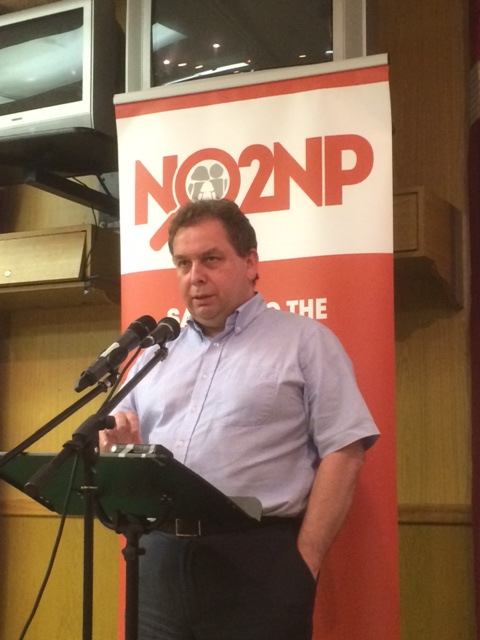
Gordon Macdonald from CARE for Scotland then summarized why NO2NP is opposed to the Named Person scheme: it’s universal, not “opt in” (indeed, there are no opt outs); it conflates welfare issues (risk of significant harm) with vague “wellbeing concerns”; and there are very broad data sharing powers, which don’t require the consent of the parent. Indeed, Named Persons are discouraged from raising the issue of consent with parents, in case it damages trust between them! Just keep them in the dark, then?!
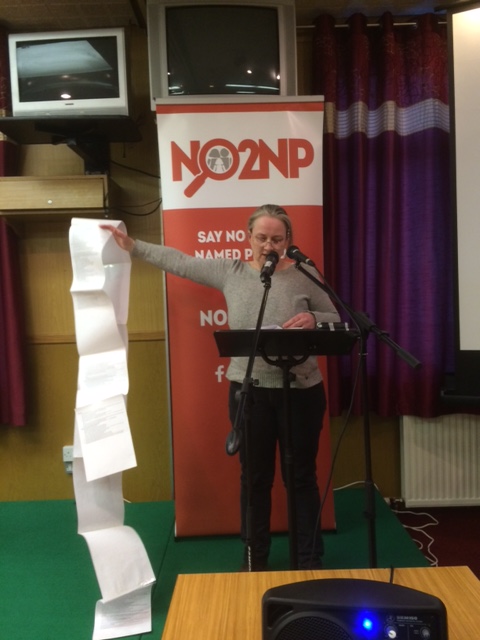
Next up was Lesley Scott from TYMES Trust, who took everyone through the detailed blueprint of young children’s lives that the Named Person will monitor with a view to ascertaining if any of the Government’s 222 risk indicators apply and whether the child should be put on a Child’s Plan, with the possibility of Compulsory Supervision Orders.
Lesley finished by saying: “The Named Person is not an entitlement; it is not simply a single point of contact. It employs a corruption of children’s rights to empower the state against parents, fatally undermining the autonomy of the family and handing the state free rein to intervene in family life whenever it feels it to be appropriate.”
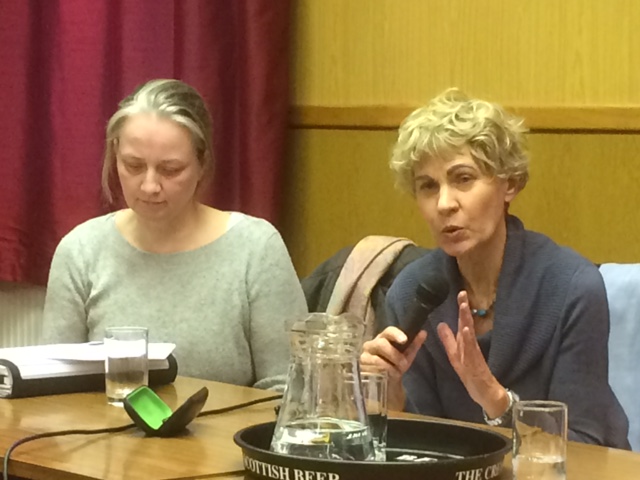
There was an excellent Q&A at the end, when people asked who was going to monitor Named Persons’ activities (nothing seems to be in place for this, beyond a complaints procedure). A social worker spoke eloquently about his opposition to the scheme and said that many of his colleagues would also speak out, but were fearful for their careers if they did.
A good number of folk signed up as NO2NP volunteers and others were happy to share their views with our cameraman – watch out for our vox pop video coming soon!
Jane Colby: Supreme Court Appeal hearing, Named Person, 2016
Posted 9 years agoThe Chair of Trustees and Executive Director Jane Colby of Tymes Trust attended the Supreme Court Appeal hearing in Westminster, 8-9 March 2016
I wanted to speak. I hadn’t anticipated that. I wanted to speak out, but as you know, it wasn’t that kind of hearing. And yet, an unexpected moment arrived when I really wanted to give evidence. Impossible of course. This was an Appeal to the Supreme Court, a war where the weapons are points of law, wielded by lawyers, before five Supreme Court Judges with minds (as was said of Miss Marple) like a bacon slicer.
The compulsory Named Person state guardian scheme. What it was, how it came to be what it was, and why it was illegal.
Why it was “mission creep”, a “service” morphed out of all recognition into a monstrous Jabberwock, gobbling up family rights and shredding their liberty to raise children in freedom.
Why it was not. And why sharing data without permission, without telling parents, was quite permissable.
Why it was not.
And that was where I wanted to speak. Data sharing? Information sharing? What data? What information?
The Supreme Court building is in every sense, awesome. A Gothic beauty designed, ironically, by a Scot, transformed inside into a glass and leather palace. Each nation of the United Kingdom is symbolised in national emblems formed in illuminated glass and coloured like jewels. Hanging high above us, high above the judges.
Jane Colby, Tymes Trust Executive Director
www.tymestrust.org @tymestrust www.facebook.com/tymestrust
NO2NP ROADSHOW: ABERDEEN
Posted 9 years agoThere was a packed gathering in Aberdeen on Monday night for the latest stop of the NO2NP Roadshow. Folk from a wide range of backgrounds came to hear our panel share their concerns about the invasive Named Person scheme.
The opening speaker, an academic who wishes to remain anonymous, pointed out parallels between the desire of socialist states to control society, with the Named Person scheme and its all-encompassing influence over every aspect of family life. He said while the Named Person scheme was intended to catch the bad parents, the effect will be that everyone will actually be trapped by it.
The speaker spoke movingly of his own family’s experience at the hands of proto-Named Persons who had misunderstood issues with his own children, leading him to submit a Subject Access Request under the Data Protection Act to see what had been recorded about his children. He was shocked to discover a 60-page document and even more appalled to find that huge swathes of it had been redacted – blotted out in black, because allegedly these issues did not relate to him or his children!
He also spoke about the weaknesses of the complaints procedure, something that the Scottish Public Service Ombudsman has recently expressed concerns about too. He found that his complaint had only resulted in the conclusion that “professionals are entitled to make professional judgments” and his only recourse now would be to go to judicial review, something his solicitor said would cost him at least £15,000!
The speaker also expressed his concern for the health and teaching professionals who will be landed with this huge responsibility, with their careers on the line should anything go wrong on their watch. “They’re not trained to be police detectives”, he remarked, concluding that he hoped the NO2NP campaign would relieve these professionals of their anxiety by securing an end to the scheme!
Next up was Lesley Scott from TYMES Trust, who said that the Named Person legislation had introduced an “authoritarian and illiberal scheme”, which “poses a considerable threat to family autonomy.” Lesley went on to talk about the National Practice Model, which is the GIRFEC ‘toolkit’. It is used to assess the ‘wellbeing’ of every child in Scotland and enables practitioners to investigate and assess all associated adults.
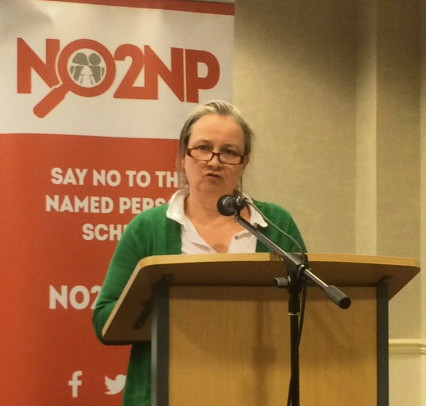
However, no one is quite sure what ‘wellbeing’ really means. This was highlighted in a debate in the Scottish Parliament in December last year, when MSP Alex Johnstone asked SNP MSP Stewart Maxwell if he could define wellbeing. Lesley played a video of the exchange, during which Mr Maxwell berated Mr Johnstone for asking such a “ridiculous” question – yet he still wasn’t able to answer it!
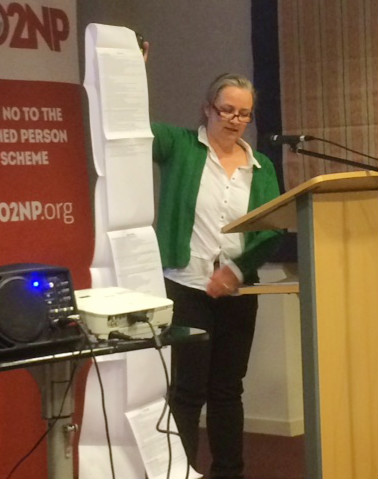
Lesley went on to explain that the “wellbeing wheel” was based on the eight SHANARRI indicators, and it also had some 304 “outcome signifiers”. She went on to highlight the complete vagueness of what constituted a “wellbeing concern”, which the Government’s guidance says can be “any matter…arising from any factor”. Lesley then explained how a child’s life is mapped out using such tools as the My World Triangle, the Resilience-Vulnerability Matrix and the three-staged National Risk Framework, where 222 “risk indicators” include: being under 5 years old, illness within the extended family, experience of bereavement, parental resistance or limited engagement, or the parent having a different perception of the problem. Lesley concluded by saying: “This GIRFEC legislation is founded on universal suspicion. It pours doubt upon parents and families, eroding the autonomy and uniqueness of family life. In short, it relegates parents to little more than the registered keepers of their own children.”

Alison Preuss of the Scottish Home Educators Forum then showed a video of Maureen Falconer of the Information Commissioner’s Office, explaining in a tutorial before the legislation had been passed that the Children and Young People (Scotland) Bill would “lower the trigger” not only for sharing information (down from “risk of significant harm” to “any wellbeing concern”) but also for child protection-like intervention. Alison suggested that Maureen seemed to put “sharing before caring”, in other words sharing data about families whenever Named Persons deemed it “appropriate”. This has been made possible because the Scottish Government passed ‘enabling’ legislation to make it legal to bypass the reserved UK-wide Data Protection Act, but only north of the border, “where children are apparently at disproportionate risk from their parents”, she said. Alison continued: “by lowering the threshold for state interference, every child and family member will be compulsorily databased and profiled so that dissenters can be easily identified and suitably ‘remediated’.” She went on: “The fact is that GIRFEC leaves Scots citizens with less legal protection than their counterparts in the rest of the UK when it comes to the use of their personal information.”
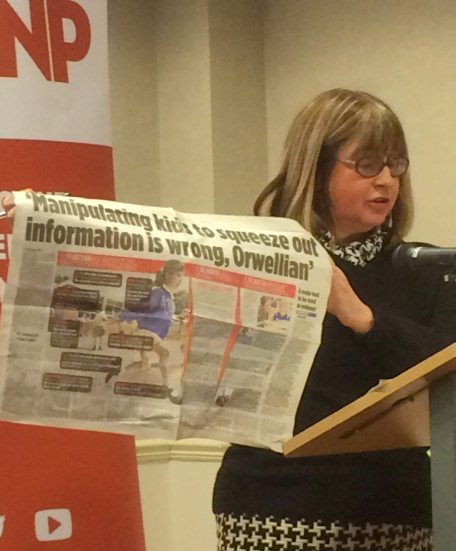
Alison held up a copy of the Mail on Sunday, which carried a major story in both its UK and Scottish editions about the covert psychological profiling of pupils in our schools and even nurseries. When she last looked, it had been shared 4300 times and there has been wall to wall outrage on social media.
Alison concluded by telling those gathered: “You should be aware that your children’s most personal thoughts and feelings are being interrogated in classrooms in the guise of ‘resilience testing’ without your knowledge, let alone consent.
Messing with young minds should not be the remit of school teachers, but has become routine with the introduction of the Curriculum for Excellence which, not very coincidentally, shares the same “well-behaving” outcomes as GIRFEC. Children are being moulded into compliant citizens who can be more easily micro-managed through life. Any dissent will be quickly identified and quashed by a series of interventions to get them back on to their state approved path of ‘getting it right’-eousness”.
Nigel Kenny from The Christian Institute then reminded the audience that our judicial review is due to be heard in the Supreme Court next Tuesday and Wednesday and, if successful, would “strike down” the legislation and nullify it before it comes into force in August. But the legal challenge is only one part of the campaign – the other part is grassroots public opposition to the unpopular scheme to let the Scottish Government know that its citizens are saying “NO to Named Persons” across the country. Several people signed up as volunteers, many of them committing themselves to join us on Saturday morning for our Action Day in the city centre. If you are free to help us raise the campaign’s profile in the Granite City, please contact us on volunteers@no2np.org
NO2NP ROADSHOW: FALKIRK
Posted 9 years agoA big thank you to all those who braved Storm Henry to come to the latest NO2NP roadshow event in Falkirk on Monday night!
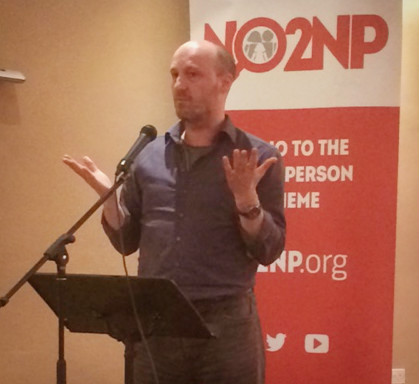
After Dr Stuart Waiton welcomed everyone, community paediatrician Dr Jenny Cunningham contended that children’s rights should not trump parents’ rights. “Parents are fully autonomous beings,” she said, “able to make their own decisions, while children are not. The principle of parental autonomy is fundamental to a democratic society.”
She went on to say that, far from respecting this parental autonomy, in recent years, social policy has seen parenting as “deficient” or “problematic” and there is a widespread consensus that the state has to intervene to address it.
Jenny emphasised that “there’s a world of difference between parental behaviour that puts children at risk of significant harm” and parenting that doesn’t fit the Government’s expectations.
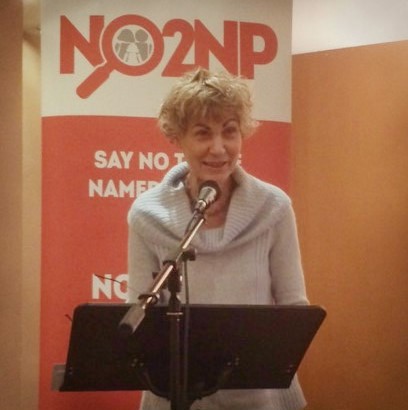
She said that “everything has been ‘GIRFEC’ed” [GIRFEC is the Government’s Getting It Right For Every Child framework] throughout health, education and social work. The legislation obligates all professionals to identify deficiencies in children’s lives and make decisions about whether their wellbeing is threatened and this is clearly seen in the new Universal Health Visiting Pathway, which will be introduced this August.
Jenny finished by saying that parenting isn’t a tick box list to be assessed by the state but a relationship between parent and child that grows at its own pace, as we are all individuals.
Lesley Scott from TYMES Trust then spoke about the recent decision of the Inner House of the Court of Session to reject our legal challenge. She quoted their use of the word “welfare” to describe the purpose of the legislation and showed how it is not interchangeable with “wellbeing”, but fundamentally different.

The Scottish Government has made this clear in their final statutory guidance, which states that “welfare and wellbeing are different, in that wellbeing is a broader, more holistic concept.” Even First Minister Nicola Sturgeon seems to be unsure about the purpose of the legislation, as she has said it is “about making sure that we are doing everything in our power to protect vulnerable children”. So, is it about child protection or children’s wellbeing?
On further scrutiny of the guidance, Lesley argued, there is “a dangerous conflation of the two [ideas]”, with the Information Commissioner’s Office conceding that there was a “lowering of the trigger” for data sharing from risk of “significant harm” to threat to “wellbeing”. This is confirmed in the guidance, which states that “a series of low level indicators of wellbeing need (whether obviously related or not) taken together can amount to a child protection issue”.
Lesley went on to point out, chillingly, that the guidance “is clear on the ability of Named Persons to use compulsion against parents and families who show any degree of non-engagement, non-compliance or mere ambivalence in the face of state functionaries’ opinions”. She went on to refer to sinister “compulsory supervision orders” which the guidance encourages Named Persons to use “at an early stage…to ensure compliance”.
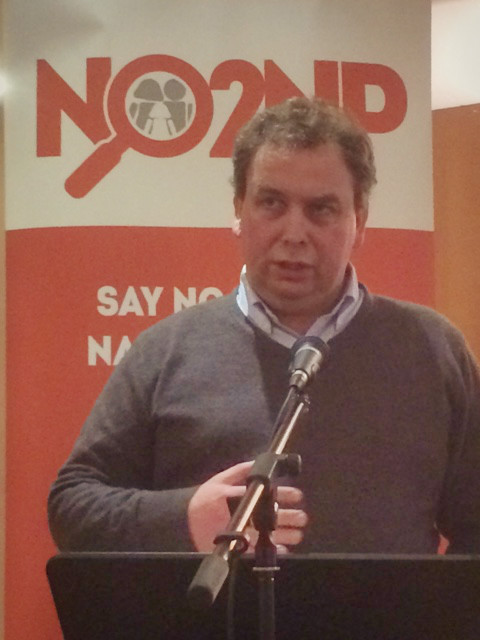
After a short video, CARE for Scotland’s Parliamentary Officer Gordon Macdonald, gave an overview of the passage of the Bill through Holyrood, stressing that it was really only children’s charities that were consulted and many of them tend to view families as potential problems. No consideration was given to religious liberty during the one morning given over to scrutinising the Bill, whose terms were applauded by the majority of the agencies invited to the session.
As a result, CARE and others involved in the NO2NP campaign, had no option but to go to court to seek to have the legislation overturned. Gordon suggested that the Court of Session had taken a “very optimistic view” of the legislation, but we were going to the Supreme Court in March and would, if necessary, go on to Strasbourg and Luxembourg, as the matter is so important.
Gordon concluded that there is a real risk of the scheme being operated in a “totalitarian” way, because individual children’s rights are being viewed in isolation from – and at times in opposition to – their relationship with their parents.
After some practical points were shared, there was an in depth Q&A, which brought out further revelations about the scheme, including that “wellbeing” was sometimes seen as whether children had sufficient “hope, love and spirituality” in their lives!
A dedicated group of volunteers will be in Falkirk’s High Street on Saturday morning for our latest Action Day, handing out flyers to shoppers and encouraging them to sign the online petition – if you are free to join us, please email volunteers@no2np.org.
NO2NP ROADSHOW: GALASHIELS HIGHLIGHTS
Posted 10 years agoThe latest NO2NP Roadshow event was held on a beautiful, sunny evening in Galashiels last night.
Gordon Macdonald, who is CARE for Scotland’s Parliamentary Officer, spoke first. He said that the family is the fundamental unit in society and, as such, deserves respect. This respect for the family is “integral” to key human rights documents, but we have seen a reinterpretation of them in recent years which marginalises parents. The Named Person legislation is a really significant shift away from child welfare to a wellbeing model that is very vague and broad. We are seeing a fundamental shift in the ideology of how the state relates to all children, he explained.
Next up was Lesley Scott of TYMES Trust, who as usual highlighted what the local authority for the area was doing about the scheme. Borders Council has devised a “Cootie Catcher” so that children can learn how to assess their wellbeing. The Council has also created a snakes and ladders type game called “On the trail of the Wellbeing Snail”, where cards are selected when a player lands on a square that determines whether they make progress or go backwards.
Click the snail for more information

The notorious SHANARRI wellbeing indicators of safe, healthy, achieving, nurtured, active, respected, responsible and included are key to this game and are intended to show children when a “wellbeing outcome” has been achieved. Examples included whether a parent had washed their child’s gym kit the night before and whether a parent had listened to their child if they were upset.
Lesley went on to explain the Wellbeing Wheel, the My World triangle, the Resilience Matrix and Genogram, all part of the Scottish Government’s “toolkit” for assessing, analysing and addressing every child’s perceived “wellbeing” needs.
After Nigel Kenny from The Christian Institute brought everyone up to date about the judicial review appeal to the Inner House of the Court of Session last week, there was the usual lively Q&A, when those who had come raised a wide range of concerns about the scheme.
The NO2NP Roadshow will be calling at the Gracefield Arts Centre, Edinburgh Road, Dumfries next Wednesday, 17th June at 7.30pm – we look forward to seeing some of you there!
‘This is about empowering Named Person to police happiness of Scottish children’
Posted 10 years agoDuring a BBC Radio Scotland debate last week Lesley Scott of ME children’s charity TYMES Trust, a supporter of NO2NP, warned that the Scottish Government’s plan was about “empowering the Named Person to police the happiness of Scottish children”.
Scott was debating Alex Cole-Hamilton, Head of Policy at children’s charity Aberlour and a proponent of the Named Person scheme. Cole-Hamilton failed to give a single example of how the Named Person scheme had made a positive impact when pressed by BBC presenter Kaye Adams.
Adams asked Cole-Hamilton: “What was happening that made anyone feel that this was necessary? Where was the gap? Where was the lack?”
Referring to the Highlands pilot he responded saying there had been “some really good examples of this drawing the threads together”.
Adams however said drawing the threads together was an “airy fairy expression” and asked for further clarification.
She pressed Cole-Hamilton again, saying: “Give me a positive example of where this has made a child or a family’s life better?
Cole-Hamilton again failed to provide a single example, but instead admitted it was about “prevention”.
He said: “I don’t have specific case examples to give you because this is all about prevention.”
Listen to the full exchange from 7 minutes 10 seconds
TYMES Trust’s Lesley Scott refuted Cole-Hamilton’s claims about the Named Person creating a single point of contact. She said parents already know who they need to go to if there is a problem, they already know who their child’s teacher, GP or health visitor is. These are all people who are already in place, she added.
Scott explained that the Named Person can access and share confidential medical data and school records. She continued: “They can question a child and give them advice, and supply services to them without the parents’ consent, and on the basis of what they think is most likely to make them happy”.
Scott also pointed out that the scheme was not about identifying significant risk or harm but about wellbeing, which is “a lower, broader undefined threshold”.
Scott also questioned how the scheme will work in practice. She raised concerns about the “enormous bureaucratic burden of the Named person” scheme on teachers and health visitors, who would be expected to administer the scheme, professions which she says are already at breaking point.
She said looking for children at risk is like looking for a needle in a haystack but all the Named Person scheme is doing is making the haystack bigger.
‘THIS IS WORSE THAN THE NANNY STATE’, QC TELLS COURT ON DAY 1 OF APPEAL
Posted 10 years agoYesterday, Aidan O’Neill QC, representing campaigners challenging the Named Person scheme, told Scotland’s highest court that the plan to give every child in Scotland a state guardian was “incompatible with the fundamental rights of a democratic society”.
O’Neill, a leading human rights expert, said the scheme created a situation “worse than a nanny state because the nanny is at least responsible to the family”.
He was speaking at the start of the appeal hearing by opponents of the Named Person legislation, after Lord Pentland rejected their initial bid last year.
During the appeal, in Edinburgh’s Court of Session, Mr O’Neill said the state should support the family in the upbringing of children as the family is the fundamental group unit of the state and entitled to state protection.
He said the Universal Declaration of Human Rights was written to counter Nazi and Fascist totalitarian states which placed value on “uniformity and conformity” and to point out that “the child is not the mere creature of the state”.
He told the court the scheme didn’t require families to give consent and offered no chance to opt in or out and said: “The presumption is every child needs a named person. That is wrong. The vast majority of parents bring up their children perfectly well. For the state to assume a responsibility for every child regardless of need or threat of harm is to go beyond what we properly expect from a democratic society that respects families and respects diversity.”
Based on the guidance issued by the Scottish Government he also drew attention to the fact that: “Not only can you not opt out of the scheme you have to positively co-operate with the named person otherwise you could be characterised as ‘hostile’ or ‘non-engaging’ which leads to further state involvement. ”
He said the compulsory nature of the law and the need to collate data on every child would result in “white noise” meaning “those who do need help get lost”.
Mr O’Neill recognised that there are conflicting issues between respect for the family and responsibility for the protection of children from harm. But he said there was no pressing social need requiring interference in the lives of every family and continued: “The overwhelming majority of children are not neglected and the Named Person scheme subverts family life and supplants parents.”
He said the scheme was drawn up to promote ‘wellbeing’ (which can include everything from mental health to a “wider vision of happiness”) among children but said: “That’s what parents do and have done through the ages. It’s not the state’s job.
“We accept there is a legitimate state interest in the protection of the vulnerable, but this is not just dealing with the vulnerable, it’s dealing with all children.
“Most families do not need the state to get involved. Some parents – a tiny minority – do cause harm to their children but that does not justify appointing a named person to every child.”
He said the central assumption behind the scheme is that “the state knows best” whereas families “are the breeding ground of diversity and individuality”.
The legal action is being brought by The Christian Institute, CARE, TYMES Trust and the Family Education Trust, with the support of academics and individual parents, all of which support the NO2NP campaign.
The appeal before Lord Carloway, Lord Malcolm and Lord Bracadale continues today with the Scottish Government’s response.
The Named Person scheme is part of the Children and Young People (Scotland) Act and is expected to be implemented nationwide in 2016.
NAMED PERSON APPEAL HEARING: Campaigners back in court today
Posted 10 years agoCampaigners opposing the Named Person scheme are back in court today for an appeal hearing after their legal challenge was rejected last year.
Lord Pentland rejected arguments that MSPs had exceeded their powers, breaching human rights rules and data protection laws, in a Judicial Review aimed at having the legislation overturned.
Now three judges will consider the proposals again.
The legal action is being brought by The Christian Institute, CARE, TYMES Trust and the Family Education Trust, with the support of academics and individual parents, all of which support the NO2NP campaign.
Community Law Advice Network (Clan Childlaw), a charity that provides legal help for children, also raised concerns about the scheme and announced it will intervene in the case.
Simon Calvert of The Christian Institute, said: “We’re asking the court to make a ruling that the imposition of a Named Person on every child in Scotland is unconstitutional and a breach of the right to a private family life.
He said they wanted the “court to look behind the Government’s rhetoric and see how this is not about protecting vulnerable children. It is about making the state a co-parent, with power to second-guess and over-ride parenting decisions about what makes a child happy. It’s Government-approved-parenting writ large”.
He added: “The trigger for intervention by the Named Person is not where there is a ‘risk of harm’. The threshold at which the Named Person can intervene in the lives of Scottish families is merely the ‘promotion of well-being’.
“The Named Person is, in effect, legally empowered to police the happiness of Scottish children. He can access and share their confidential medical data, their school records, he can question children and give them advice and supply services to them without their parents’ consent – all on the basis of what he thinks is most likely to make them happy. That is an outrage. Thousands of people across Scotland know it is an outrage, and that’s why they’ll all be hoping our judicial review succeeds.”
Announcing new Roadshow dates for May and June
Posted 10 years agoWe are pleased to announce more NO2NP Roadshows coming up in May and June.
Supporters from across Scotland often contact our team requesting a NO2NP Roadshow in their area and we do our best to try and make it happen.
Let us know if you would like one in your area by emailing: admin@no2np.org
It’s still surprising how many people are unaware of the Named Person legislation. Help us spread the word by telling people about the Roadshows. Experts will be sharing about the background to the plans and concerns surrounding the scheme.
DOWNLOAD AND SHARE THE FLYER
NO2NP Roadshow: Elgin highlights
Posted 10 years agoThe campaign saw strong support in Elgin last night as concerned parents and individuals, with some traveling quite a distance, turned out for the latest NO2NP Roadshow.
Nigel Kenny of The Christian Institute explained that the campaign was made up of a broad coalition of organisations and individuals from academia, charities, education, medicine, politics and social work. He said all those involved have a shared concern for the importance and autonomy of the family in raising the next generation.
Videos were shown, the first explaining the background to the campaign, and the second from First Minister’s Questions last week, when NO2NP supporter Liz Smith MSP challenged Nicola Sturgeon over Clan (Community Law Advice Network) Childlaw’s concerns about data sharing.
Lesley Scott from Tymes Trust then spoke about the blueprint for every child’s life that has been planned under the GIRFEC (Getting It Right For Every Child) model, including the Wellbeing Wheel, the My World Triangle and the Resilience Matrix. She pointed out that Edinburgh University had identified no fewer than 304 outcomes that could arise from the SHANARRI “wellbeing” indicators.
Nigel finished off the talks with an update on the judicial review appeal (due to be heard in Edinburgh on 3rd and 4th June) and some tips on how people can get involved with the campaign.
There was a lively and extended Q&A at the end, where people expressed their deep concerns about the negative impact that the scheme will have on families, schools and society at large.
The NO2NP Roadshow will be stopping off at Falkirk next on Wednesday 27th May, when we’ll be at the Best Western Park Hotel in Camelon Road at 7.30pm. Hope to see you there if you live in and around the area!
NO2NP Roadshow: Aberdeen highlights
Posted 10 years agoThe latest NO2NP Roadshow event was held in the Aberdeen Arts Centre on Monday (11th May), where one local woman’s run in with an emanation of the Named Person scheme at her daughter’s school was raised during Q&A as a matter of concern. Even more concern was expressed when it was revealed that a GP would be obliged to share confidential patient details about, for example, a mother’s struggle with depression with her child’s Named Person.
After a video was shown about the judicial review in the Court of Session, Abertay University sociology lecturer Dr Stuart Waiton spoke about the disjuncture between the people and the powerful and how, over the past century, children were no longer being seen in the context of their families and government was increasingly seeing its role as one of “risk management”.
Lesley Scott of Tymes Trust then made reference to the quote in a recent newspaper article by Acting Minister for Children and Young People that the Named Person legislation “is about making sure that we are doing everything in our power to protect vulnerable children.” Lesley then pointed out that the word ‘vulnerable’ does not appear anywhere in the legislation or in the draft statutory guidance. Instead, she said “this legislation is about measuring the wellbeing of each and every child.”
Some practical points on how people can be involved in helping the NO2NP campaign were then shared by Nigel Kenny of The Christian Institute, before a lively Q&A, always one of the high points of these Roadshows.
Our next event is in Elgin this coming Monday (18th May) at the Laighmoray Hotel, Maisondieu Road, Elgin, IV30 1QR at 7.30pm – please do come along and find out more about the campaign.
NO2NP Roadshow: Edinburgh highlights
Posted 10 years agoOn 23rd April the NO2NP Roadshow hosted a well-attended meeting in Portobello on the outskirts of Edinburgh. Dr Stuart Waiton chaired the event and spoke of the decline in the view of the family as an intrinsically good institution, instead it is now seen as the source of most children’s problems.
The first speaker was social work consultant Maggie Mellon, who said that it was “absurd” to assume that every child in a family “is potentially at risk and that information must be shared equally about all of them just in case”.
Then Lesley Scott of Tymes Trust, representing families of young ME sufferers, spoke about the shift in the Named Person legislation to focus on wellbeing meaning that “the threshold for intervention in a child’s life has been drastically lowered from ‘at risk of significant harm’ to that of a worry over something as intangible as wellbeing. This means that significant decisions are open to personal interpretation and bias on the part of the named person.”
Finally, Nigel Kenny of The Christian Institute gave some practical points, as well as an update on the judicial review appeal, which has now been fast-tracked to be heard by the Inner House on 3rd and 4th June.
NO2NP Campaign update: More roadshows on the way
Posted 10 years agoMany thanks to all who attended the latest and well-attended NO2NP roadshow in Greenock last Thursday (5 February), which was the second of six meetings already planned for this year.
The main speaker was Lesley Scott of Tymes (Young ME Sufferers) Trust. Lesley cited fears that non-engagement with the named person scheme could lead to further intervention and child protection action. She explained that the scheme puts the authority of the state ahead of parents and families, and said that the intervention threshold has been lowered.
The next stop for the roadshow is the Carnegie Conference Centre in Dunfermline this coming Wednesday (11 Feb) at 7:30pm. Speakers will include Dr Stuart Waiton (Abertay University) and Liz Smith MSP (Mid Scotland and Fife).We hope to see you there.
For a full list of forthcoming (and previous) roadshows, see below:
GLASGOW (WEST END) – 23 March 2015
DINGWALL – 4 March 2015
CUMBERNAULD – 26 February 2015
DUNFERMLINE – 11 February 2015
GREENOCK – 5 February 2015
LIVINGSTON – 21 January 2015
MONTROSE – 26 November 2014
PERTH – 12 November 2014
IRVINE – 23 October 2014
ABERDEEN – 15 October 2014
INVERNESS – 1 October 2014
STIRLING – 29 August 2014
DUNDEE – 27 August 2014
GLASGOW – 21 August 2014
EDINBURGH – 9 June 2014 (CAMPAIGN LAUNCH)







